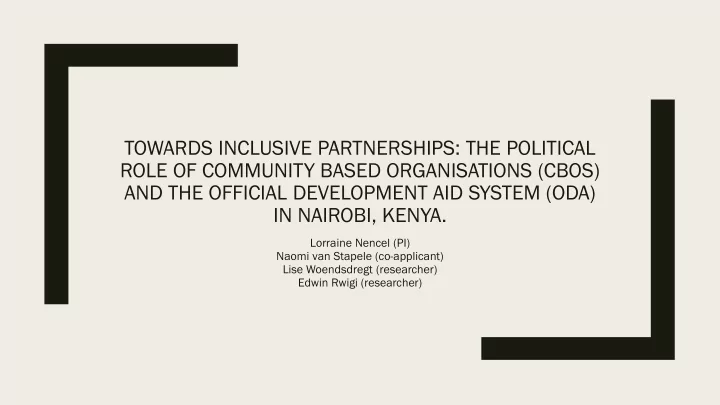

TOWARDS INCLUSIVE PARTNERSHIPS: THE POLITICAL ROLE OF COMMUNITY BASED ORGANISATIONS (CBOS) AND THE OFFICIAL DEVELOPMENT AID SYSTEM (ODA) IN NAIROBI, KENYA. Lorraine Nencel (PI) Naomi van Stapele (co-applicant) Lise Woendsdregt (researcher) Edwin Rwigi (researcher)
Focus of Research and what we wanted to know ■ Two activist CBOs with different positions in the Official Development System in Nairobi, but both groups marginalized, criminalized and stigmatized ■ How access to funding influences the issues CBOs prioritize and the ways they address them; ■ The ways in which CBOs participate and contribute to policy making with government institutions; ■ How involvement in different networks and alliances strengthen and/or weaken CBOs political roles; ■ How CBOs daily practices of dealing with urgencies, decision-making, capacity building, outreach work, donor demands, etc. increase and/or impede their political roles and; ■ What CBOs members’ experiences reveal about their relationship with and effectiveness of the CBO in empowering their members to manage and navigate injustices.
How did we do this? ■ Our project studied the ODA system from the CBO perspective. ■ Use of ethnography and community-led research enabled us to capture the daily dynamics and provide rich descriptions of the daily chaos of urgencies as well as the power intricacies between CBOs, NGOs and donors, grasped by CBOs in the language of coloniality and dehumanization or a shorthand term “donkey work”. ■ To avoid the possibility of bias, we conducted more than 40 interviews with NGOs to understand the other side of the power relation.
Conclusions: ■ Relationship between (I)NGOs and CBOs – CBOs and NGOs should be distinguished as different actors – CBOs felt most NGOs merely use them, did not treat them as equal partners. – NGOs financial support is project-based providing little or no core support. – One-sided accountability – Ideal role of NGOs ‘ally-ship’ ■ Comparision of the CBOs: – Social justice CBO less embedded more flexible closer to members – Gay Sw-er CBO more embedded further from members but can work towards structural change – Both CBOs in our study engage in various ways of doing advocacy on different levels – Importance of International and National networks
Policy Recommendations ■ Increased autonomy and flexibility for CBOs, as well as mutual accountability, would allow CBOs to perform their political role more effectively. ■ Agenda setting and strategic implementation can only be realized when CBO’s are given full responsibility of the entire development process of new interventions, programs or project ■ It is imperative to restructure the aid chain such that it works towards a new type of partnership, in which NGOs work towards the autonomy of CBOs ■ An instrument is required to monitor mutual accountability within NGO-CBO partnerships ■ Donors and NGOs can support CBOs in terms of capacity building; however, the CBO should take the lead in deciding what capacities need building and how ■ Donors should be more aware of the importance to support long-term change and structural interventions, rather than short-term results ■ Funding should allow for core funding decent salaries, health insurance etc., in order for people to be able to sustain themselves while risking their lives at the frontline of activism. Short term funding is also possible, but within a long-term framework core support. Flexible emergency funds need to be included in funding strategies which enable CBOs to respond to unanticipated emergencies or events. ■ Priority in donor strategies should also be given to collaboration between groups and networks ■ The definition of advocacy should be broadened to include actions on different levels – from the political to sensitization on the level of daily lives ■ Donors should increase the possibility to fund CBOS in different stages of organizational development
Recommend
More recommend